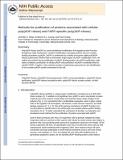Methods for Purification of Proteins Associated with Cellular Poly(ADP-Ribose) and PARP-Specific Poly(ADP-Ribose)
Author(s)
Rood, Jennifer E.; Leung, Anthony; Chang, Paul
DownloadChang_Methods for purification.pdf (640.5Kb)
OPEN_ACCESS_POLICY
Open Access Policy
Creative Commons Attribution-Noncommercial-Share Alike
Terms of use
Metadata
Show full item recordAbstract
Poly(ADP-ribose) (pADPr) is a posttranslational modification that regulates protein function through two major mechanisms: covalent modification of acceptor proteins and noncovalent binding of proteins to pADPr. pADPr is synthesized by a family of enzymes called poly(ADP-ribose) polymerases (PARPs) that are themselves major targets of pADPr modification. Here, we outline two methods for the purification of pADPr-binding proteins via pADPr purification under native conditions: purification of cellular pADPr and pADPr covalently linked to specific PARPs. Together, these methods provide complementary approaches to the identification of noncovalent pADPr–protein interactions in the cell.
Description
available in PMC 2012 November 09
Date issued
2011Department
Massachusetts Institute of Technology. Department of Biology; Koch Institute for Integrative Cancer Research at MITJournal
Poly(ADP-ribose) Polymerase: Methods and Protocols
Publisher
Springer Science+Business Media
Citation
Rood, Jennifer E., Anthony K. L. Leung, and Paul Chang. Methods for Purification of Proteins Associated with Cellular Poly(ADP-Ribose) and PARP-Specific Poly(ADP-Ribose). In Poly(ADP-Ribose) Polymerase: Methods and Protocols. Alexei V. Tulin (ed.). New York: Springer-Verlag, 2011. pp 153-164. (Methods in Molecular Biology; v.780).
Version: Author's final manuscript
ISBN
978-1-61779-269-4
978-1-61779-270-0
ISSN
1064-3745
1940-6029